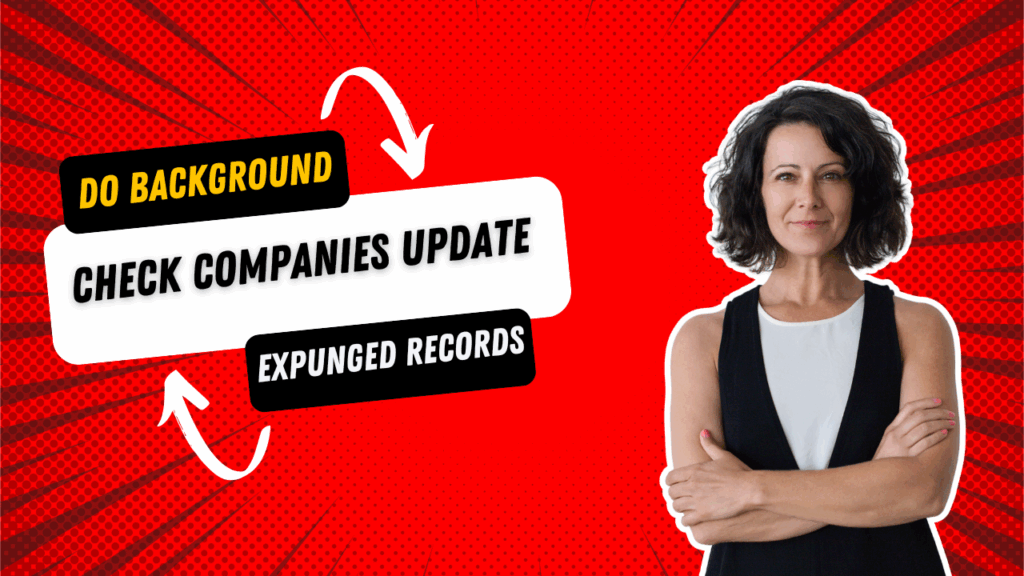You went through the process. You got your record expunged. You thought it was gone.
But then a job offer stalls. Or a landlord says no. You run a background check on yourself and boom. The arrest or case is still there.
So what’s going on? Do background check companies update expunged records?
Sometimes they do. Sometimes they don’t. And that’s a big problem.
Dig Deeper: How to Remove Court Records from Google Search
Why Expunged Records Still Show Up
They Pull from Old Data
Most background check companies aren’t pulling live info. They scrape court records and public sources, then store that info in their own database.
Once it’s in there, it stays unless they get a reason to update or delete it.
That means even if your court file is cleared, the old version might still exist in their system.
They Don’t Get Automatic Updates
Expungement isn’t broadcast to every company that might have your info. There’s no magic email that goes out to data brokers.
You have to tell them. That’s on you.
According to a 2022 Consumer Reports investigation, 34% of background checks contained errors. Many were outdated or expunged records.
Some Sites Just Don’t Care
Let’s be honest. Some background sites are sketchy. They make money from fear and curiosity. Cleaning up bad info is not their top priority.
If they ignore your request or make it hard to file one, that’s no accident.
Which Companies Are the Worst Offenders?
- BeenVerified
- Intelius
- TruthFinder
- MyLife
- PeopleFinders
These sites often republish court data even after it’s been cleared. Some update monthly. Others may not update at all unless you force the issue.
They’re not breaking the law unless you give them written proof and they refuse to remove it. Then you may have a case.
What You Can Do About It
1. Run a Self Background Check
Search for your name on Google. Use terms like “arrest,” “mugshot,” and your city.
Then check the big data sites directly. Some of them let you view your own report for free. Others charge, but it’s worth it to know what employers might see.
2. Contact the Company
Each site has its own opt-out or dispute form. Look for links at the bottom of the page:
- “Remove My Info”
- “Data Dispute”
- “Privacy Request”
Send proof of your expungement. This might include:
- A court order
- A letter from your lawyer
- A certificate of compliance
Always take a screenshot of the form and save your email.
3. Use the Fair Credit Reporting Act (FCRA)
Under the FCRA, consumer reporting agencies have to ensure their info is accurate and up to date.
If you tell them it’s wrong, they’re legally required to investigate. If they don’t, you can report them to the FTC or file a lawsuit.
The law says they have 30 days to respond.
4. Freeze or Opt Out of Data Brokers
Sites like Spokeo, Whitepages, and Radaris offer opt-outs. Some expire after a few months. You may need to repeat the process.
Use services like:
- OneRep
- DeleteMe
- Incogni
They handle this for you. Or you can go DIY and knock them out one by one.
5. Push It Down in Google
If the info still shows up in search, you can suppress it. Build content that outranks it:
- Personal blog
- Social media profiles
- LinkedIn updates
- YouTube videos
You’re not hiding. You’re competing.
And you control the narrative.
What About Google Removal?
If your expunged record still shows in Google search, but the link is dead or outdated, use Google’s removal tool.
Go to: Google’s Remove Outdated Content Tool
Submit the link and a quick explanation. If the content has changed or been removed from the original site, Google may take it out of search results.
This only works for outdated links or content that violates Google’s privacy policies.
Why the System Is Broken
Expungement laws vary by state. So do rules about what private companies can show.
Some states like California and New York are stricter. Others offer less protection.
The National Consumer Law Center says that record-clearing laws often fail to keep up with how data is sold and reused.
That’s why even when you do everything right, your cleared record can still follow you around.
One Case That Says It All
In 2021, a man in Texas had his record sealed by court order. Months later, it still showed up on four background sites.
He contacted them. Two responded quickly. One took six weeks. One never replied. He ended up hiring a lawyer and suing under the FCRA. He won.
It shouldn’t take a lawsuit to fix something the court already cleared. But sometimes, it does.
Final Tips and Takeaways
- Don’t assume your expungement is complete until you check
- Be ready to file disputes with every site showing the record
- Keep copies of all your court orders and emails
- Use Google’s tools and SEO to clean up search results
- If all else fails, talk to a lawyer
Cleaning up expunged records is work. But it’s worth it. Your future shouldn’t be judged by something the courts already cleared.
You don’t need to face it alone. A reputation management service like Top Shelf Reputation can track these sites, file takedown requests, and push your best side to the top of search.
It’s your name. Own it.
Need help? Top Shelf Reputation specializes in managing court records online, even when they can’t be fully removed. Contact us today to take back control of your online image.

